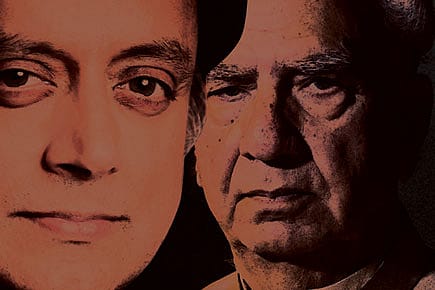Of Shashi and Shanta

There is hardly anything that makes Shashi Tharoor and Shanta Kumar partners in a certain kind of political culture. Tharoor strayed into politics after a successful career in international diplomacy. He has written some remarkable fiction before becoming a prolific non-fiction writer and public speaker. He is a widely consumed—and reviewed—product of the media age. He is its child as well as its manipulator; in the 24/7 news cycle, Tharoor continues to update his relevance by tapping on his smartphone to produce a 140-word shocker or by writing an essay of 2,500 exquisite words (mostly in Open nowadays). Whether in power or in the public arena, controversy accompanied his open mindedness, the provincialism of the world he inhabited collided with his internationalism, and the naiveté of the outsider-romantic crashed on the granite party establishment. He refuses to learn the lessons the high command repeatedly asks him to learn. He cannot afford to be stale news, and that is one reason why he appears in this column too.
In his latest 'indiscretion', he has told the party that its stalling method in Parliament, with the strength of less than 50 members, is pointless. Engage, discuss, dispute, and attack with counter-argument—that is what he has meant. Sonia Gandhi reportedly told him: "You always do this; it has become a habit with you." Translation: It is a bad habit to have a mind of your own in the Firm, where the family stakeholders demand a copyright over your conscience, and after all—don't you know?—it is the sheltering shadow of the family that has kept you alive, and it is your servitude and submission, your frozen mind and your appreciation of the sacrificial legacy of the family, that make you a true Congressman. Still, Tharoor cannot shed the bad habit.
AIming High
20 Feb 2026 - Vol 04 | Issue 59
India joins the Artificial Intelligence revolution with gusto
Shanta Kumar, at 80, is a veteran. He has been there with us as Chief Minister, Cabinet minister and parliamentarian, but never in the front row of national politics. He is what we call one of the senior leaders in the BJP, and nothing has set him apart as a leader with a difference. In the age of Narendra Modi, the default mindset of the ruling establishment is celebration, and those who are momentarily distracted by the shrillness from the cultural right or the happenings in Shivraj Singh Chouhan's Madhya Pradesh or the humanitarian diplomacy of Sushma Swaraj are condemned as not worthy of being part of the revolution. Then, in the party of terrifying consensus, Kumar differed: "From Rajasthan to Maharashtra, people started pointing fingers at us. Reports about Madhya Pradesh's Vyapam scam made all of us bow our heads in shame." He of course praised the leadership and achievements of Modi; it was the atmospheric pollution that saddened him. He stood up against the official culture of denial, and his was a lone voice from within that echoed the sentiments of those who want Modi to succeed but feel let down by his inexplicable tolerance of people he—and the country—can do without. Kumar was shrugged off as an anomaly, as a man whose mind was corrupted by the media, the favourite bogeyman of leaders in denial.
Tharoor and Kumar, though coming from two different political cultures, are united by a familiar trait of controlled democracy. They are all the more worth listening to because India is not such a democracy, no matter what LK Advani thinks the future holds for him. Tharoor belongs to a party that has systematically squandered India's oldest political tradition. The moment he—or any such deviating delinquent—shatters the idyll maintained by Our Lady of Deliverance and the Prince Who Detests the Crown, it is nothing but an act of betrayal, of thanklessness, of unwarranted freedom. The rubble of Congress today is an organisation of ventriloquists, still waiting for an original voice that can inspire and energise the base. Tharoor's was a voice of reason.
On the other side of the political aisle, BJP is a party originally hardened by its struggle for power, and it has mythicised the idea of the strong leader. The strong leader is also the only leader, and Modi has been playing out his singularity, his exceptionalism, since his Chief Minister days in Gujarat. He is India's most overwhelming Prime Minister after Indira Gandhi, and he is here because Candidate Modi was different—a rejoinder to politics as usual, an outsider semaphored by history. There was no party with a difference then. There was a leader, though. In power, he is duty bound to play by the rulebook of politics-not-as-usual. He cannot play by the rulebook of the disgraced. He is different, and he should be raising the bar further. He should not let a discredited Shivraj Singh Chouhan or a triangulating Sushma Swaraj spoil the party. And it is not a bad idea to listen to someone else's voice too, even if it is Shanta Kumar's.
The plight of Tharoor and Kumar brings out an Indian paradox: The volatility of our democracy is not matched by openness within the parties, and most of them still dance to the tune of the maximum leader. That is why Sonia Gandhi thinks speaking up is a bad habit. That is why Narendra Modi thinks there is no need for internal arguments so long as he can converse directly with the people.
